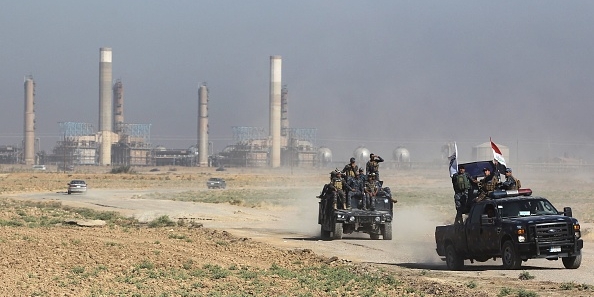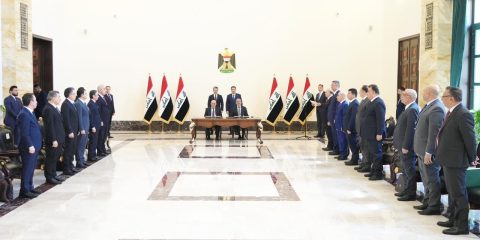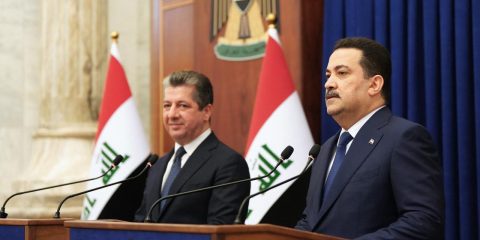IS insurgency exploits Baghdad-KRG conflict
Thousands of federal and Kurdish soldiers are pointing their weapons at each other, leaving volatile territory inadequately guarded and vulnerable to an emboldened IS insurgency.
KIRKUK - The self-proclaimed Islamic State (IS) militant group is taking advantage of new security gaps in northern Iraq, capitalizing on a deteriorating rivalry between Baghdad and the Kurdistan Regional Government (KRG).
Insurgents have launched an escalating campaign of guerrilla-style attacks since Oct. 16, when federal security forces began to shift their focus away from IS and launched an operation to reclaim Kirkuk and other disputed territories from the KRG.
"Attention is being taken away from the ISIS threat and [focused] more on posturing and positioning between the Iraqi and Kurdish forces," said Col. Ryan Dillon, a spokesperson for the U.S. military in Iraq. "There have been about 10 events happened in last few weeks that lead us to believe that ISIS is exploiting... this opportunity."
The most deadly recent attack, on Tuesday, hit the disputed town of Tuz Khurmatu, about 50 kilometers southeast of Kirkuk. A car bomb killed at least 20 people and injured about 60 when it exploded in a bazaar in the Askari neighborhood, according to three local security officials.
In many rural areas around Kirkuk where the federal government has recently taken control, residents and local leaders say, Iraqi forces have not provided adequate defenses against IS.
"We always expect Daesh to attack us," said Saman Mhedin, a farmer who lives in Kirkuk's Daquq district, where IS militants have raided several villages with impunity. "There is really no one to prevent them from attacking us."
Although villages are being left undefended in areas still threatened by insurgents, Iraqi leaders have diverted thousands of troops away from the war against IS and into an ongoing operation to roll back the territorial footprint and political powers of the KRG.
Federal forces and Kurdish Peshmerga have deployed some of their most highly trained forces northwest of Mosul, where their weapons are trained on each other across a long front line. Following a prolonged battle on Oct. 26, which claimed dozens of casualties, both sides have sent more and more reinforcements to the area.
Iraq Oil Report has obtained 4 gigabytes of aerial surveillance photos - gathered by KRG intelligence from late October to the present, in seven villages along the front lines - showing drastically increasing Iraqi deployments of Abrams and T-72 tanks, scores of other armored vehicles, over 100 artillery pieces, and dozens of missile and rocket launchers.
"If you look at all of the equipment that's there, it's maybe [the equivalent of] an armored brigade," said an independent satellite imagery expert, who corroborated the KRG surveillance photos using commercially available satellite imagery taken from late October through mid November.
Several Iraqi military officials - including Yahya Rasool, a spokesperson for the Iraqi military's joint command, and Sabah al-Numan, the spokesperson for the elite Counter Terrorism Service (CTS) - have confirmed that government forces are deployed south of Feyshkabour, including the CTS, the Federal Police and its Emergency Response Division (ERD), Iraqi Army forces, and several paramilitaries operating under the government's al-Hashid al-Shabi (Popular Mobilization) program.
Their goal, according to Rasool, is "re-imposing federal authority" over territory currently held by the KRG, including the strategic Feyshkabour area, which includes an oil export pipeline to Turkey and border crossings with both Turkey and Syria.

A sample of the surveillance of federal Iraqi forces gathered by the KRG and obtained by Iraq Oil Report. This image shows Iraqi forces near the village of Ahmed Agha, northwest of Mosul and just south of Peshmerga front lines, on Nov. 7, 2017.

Surveillance imagery gathered by the KRG shows Iraqi federal forces near the village of Ahmed Agha, northwest of Mosul, on Nov. 12, 2017. Compared to imagery gathered five days earlier, a significant military buildup can be seen.
Satellite images also show that the KRG has dug a massive defensive trench stretching across the front lines south of Feyshkabour, from the Syrian border up past the Mosul Dam lake. The trench did not exist as of mid October, but it now stretches more than 40 kilometers long and is punctuated by fire bays every few hundred meters.
KRG analysts have estimated, based on their imagery and other intelligence, that the Iraqi government has deployed roughly 7,700 troops to the area, most of whom are concentrated in seven villages along the front lines.
"The excessive Iraqi military deployments signal that they want to change political equations and borders by war," said Halgurd Hikmat, spokesperson for the KRG Ministry of Peshmerga. "This is not acceptable for us. We do not want this war, but we are defending our land."
Insurgents resurgent
Federal forces and Kurdish Peshmerga coordinated closely in 2016, ahead of the offensive to liberate Mosul. During that time, as IS lost territory across northern Iraq, many militants began reverting back to the asymmetric insurgency tactics that characterized the group's progenitor, al-Qaida.
Now that federal and Kurdish forces have turned their weapons on each other, those IS guerilla-style attacks are picking up in frequency.
"It is two-fold," Dillon said. "We have the focus of the military being drawn away from the fight against [IS], and ISIS recognizing this and taking advantage of it and being more aggressive than they would if the focus had been there."
While insurgents have perpetrated a few high-profile, mass-casualty suicide bombings - like Tuesday's attack in Tuz Khurmatu, and the Nov. 6 bombing of a Hashid base in Kirkuk city - most of their operations have targeted remote villages.
Also on Tuesday, for example, a team of at least seven IS militants infiltrated a school building in the village of Hushtralook in Makhmour district, about 50 kilometers northwest of Kirkuk city, and held their ground for hours when government-backed security forces responded.
Two sources gave slightly different accounts of the incident. Nazhan al-Luhaibi, a commander of government-backed tribal forces in the area, said nine IS militants and three tribal fighters were killed or injured; Rashad Gallali, the head of the Patriotic Union of Kurdistan (PUK) political party office in Makhmour, said one tribal fighter was killed in a gun battle and all of the IS militants were killed when an Iraqi airstrike destroyed the school building.
Many recent incidents in the rural areas around Kirkuk city have followed a familiar pattern, according to security officials, eyewitnesses, and residents: IS militants attack an undefended village, hold the area until security forces finally arrive, and ultimately retreat.
"This is what we expect from security forces now.... They will only come after Daesh takes over the village," said Mhedin, the farmer in Daquq district, who has tried to help fill the security vacuum by participating in a kind of armed neighborhood watch. "Every night, about 10 men take turns guarding our village."
Some leaders at the district level claim they are well defended, citing the presence of large detachments of Iraqi Army units, police, and Hashid paramilitaries. But residents say there simply aren't enough security forces to establish a continuous presence in the dozens of rural villages that compose each district.
As a result, security forces can respond to insurgent attacks but not prevent them. And IS militants appear to be enjoying increased freedom of movement that allows them to threaten areas that were previously considered safe.
"This is the first time mortars have fallen in this village and even the whole sub-district," said Arf Adl, director of Diyala province's Jabara sub-district, after IS militants shelled the village of Khoshan on Nov. 7 and 8. "Residents have seen Daesh militants in the area several times."
In other parts of northern Iraq, which were recently reclaimed from IS militants, local officials worry that the thinning presence of government security forces could leave space for insurgents to make a comeback.
"Following the recapture of Hamam al-Alil, the Federal Police had an entire brigade deployed," said Bashar Yousif Mohammed, the mayor of Hamam al-Alil, a southern suburb of Mosul. "The presence of Federal Police at this point comes down to one regiment composed of about 500 members.... The security situation to a certain extent is under control, but most definitely we need additional forces in Mosul and south of Mosul."
Eyes off the ball
Most of Iraq's disputed territories had been under the de facto control of the KRG since June 2014, when the Iraqi Army retreated in the face of a massive IS offensive and Peshmerga moved to fill the vacuum.
The balance of control changed profoundly, however, after the Iraqi military completed an October offensive to liberate Kirkuk's Hawija district. As the IS group lost the last of its territory in northern Iraq, Prime Minister Haider al-Abadi shifted his sights toward reclaiming disputed areas from the KRG.
On Oct. 16, Iraqi forces launched an operation to establish federal control in Kirkuk. Because of deep fissures in the KRG's leadership - some of whom had agreed to cooperate with Abadi - the Kurdish military response was disjointed and resulted in both deadly fighting and a chaotic retreat.
Due to the KRG's disarray, federal forces quickly advanced further than they appeared to have planned for. Within a matter of days, they became responsible for thousands of square kilometers of new territory, which they have been unable to police as effectively as other parts of the country.
"What we have seen throughout other areas in Iraq, we have patrols and very aggressive ISF [Iraqi security forces].... They are dismantling [IS cells] before elements are able to plan and coordinate attacks," said Dillon. "I think it shows the difference between other areas in Iraq, where the focus is on maintaining gains to make sure IS doesn't have a resurgence... as opposed to recently in Hawija and Kirkuk."
Despite the challenge of fortifying its vast gains, the Iraqi military now appears to be focusing some of its most capable fighting forces and heavy weaponry on Feyshkabour.
After the KRG repelled an Iraqi military advance, on Oct. 26, the U.S. helped broker a temporary ceasefire, and military commanders have met for multiple rounds of negotiations, even as they deployed more troops and weapons to their front lines. The negotiations have yielded little progress.
"They see themselves as war-victorious and us as the loser," Hikmat said. "We totally reject this logic. They have understand that the reality is not what they have in their mind.... It is difficult to reach any agreement while the Iraqi leaders work with this logic."
The KRG has proposed joint administration and tripartite security control, with the U.S. military serving as a neutral broker.
Baghdad has demanded exclusive control of the border crossings and oil export facilities, according to officials on both sides who are familiar with the talks. Such an arrangement would effectively allow the federal government to function as a valve at a key choke point of the KRG economy.
"We will regain control on border areas without escalation," Abadi said in a Nov. 14 press conference. "But our patience will run out. We will not wait forever. We will take action."
As the two armies continue their buildup, the KRG has asked the U.S. to appoint a special envoy to help mediate the crisis. The State Department, however, has not even acknowledged a military escalation.
In response to requests for comment on U.S. efforts to help reduce tensions, a State Department official characterized the Oct. 26 battle between federal and Kurdish forces as "limited skirmishes," and said "the Department of State is aware that both ISF and Peshmerga have been repositioning."
On Tuesday, State Department Spokesperson Heather Nauert said Secretary of State Rex Tillerson had recently made phone calls to both Abadi and KRG Prime Minister Nechirvan Barzani, and would not be appointing an envoy.
"I don’t know that there’s that much more that we can do," Nauert said. "We think that they can probably work it out on their own."
Iraqi staff reporting from Kirkuk and Baghdad are anonymous for their security. Rawaz Tahir reported from Erbil. Araz Mohammed reported from Kalar. Amir Ali reported from Khanaqin. Mohammed Hussein reported from Spain. Samya Kullab reported from Beirut. Ben Van Heuvelen reported from the United States.





